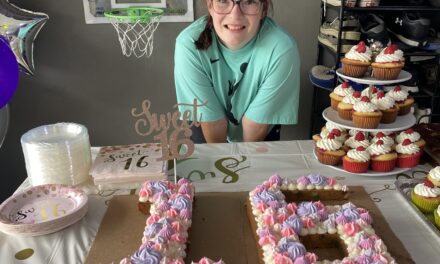By: Tristin Plienis
The warm May day started like any other, with our one-year-old son Brooks and his sisters heading off to daycare as my husband and I went to work. In less than 24 hours, we were in the emergency room, and Brooks was paralyzed from the breast bone down. At the end of those two days, our world changed when he was diagnosed with Transverse Myelitis, an inflammation of the spinal cord that interrupts the messages the spinal cord nerves send throughout the body.
Being thrown into a medical emergency you didn’t see coming can be very isolating and terrifying. Nobody is there to pick you up in that hospital room, especially during the COVID restrictions. And when you get the bad news, you must find a way to keep breathing. At first, you’re just trying to survive. Months later, you start to process it, which brings another layer of heaviness. It’s similar to grief. Somedays, it feels like we have come so far and are in a great place. And other days, it’s a crashing wave pulling me under emotionally.
When a medical event happens, its effects ripple into the relationships with your spouse, kids, family, friends, and community. Learning that my husband, Derrick, and I processed this situation differently and finding ways to support each other was challenging. The mom guilt I experience while away from Aubrey and Willow during Brooks’ care is tough, but I try to give them equal attention and ensure they always know how much I love them. We were blessed to have great support from so many in those early months, in helping care for the girls, funds to support our hospital bills, and meat to fill our freezer. But it is often hard for others to fully understand his rare diagnosis and progress. Tough conversations become normal. While the therapy he has received is helping tremendously, he still has a long way to go. He can stand now but not walk, which has been hard for people to comprehend.
It can be challenging to be a parent, especially to three young kids. The fact that one of those children may require a different level of care means that I must make my physical and mental health a priority. I have learned how important it is to speak with compassion and seek understanding as I connect with other families.
There will be some hard days, moments you want to give up, and times you feel like you just can’t handle. In these moments, I found short mantras to repeat to myself:
- One hour at a time.
- Just keep putting one foot in front of the other.
- Be still and know.
- You can do this.
- Just keep breathing.
Although simple, I repeated it until I believed it. Going through a traumatic experience is isolating, and sometimes you must pick yourself up and be your own hero. It is crucial to find people you can talk to openly and honestly, whether friends, a church or support group, or a therapist. I connected with other “medical moms” who understood the path I was about to embark on and allowed me to reach out as often as needed.
Our society is so focused on the “highlight reel,” and while I love celebrating the good, let’s not be afraid to value the hard times just as much because that is where people change and grow. I used to be happy only when everything was perfect, but I have quickly learned that we must also learn and practice happiness in the storms. Sadness and joy can exist together.
In any situation you find yourself, learning to accept your reality will help you start to see the things you love in your reality. Caring for Brooks and helping him through this journey will be one of my most important works on this earth, along with raising his beautiful sisters. They are my priorities and my greatest treasures. Together, we will continue to love and support each other through our new-normal journey.














